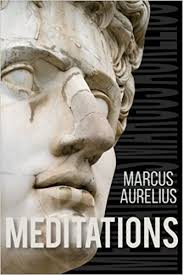Meditations Page #19
Meditations is a series of personal writings by Marcus Aurelius, Roman Emperor from 161 to 180 AD, recording his private notes to himself and ideas on Stoic philosophy. Marcus Aurelius wrote the 12 books of the Meditations in Koine Greek as a source for his own guidance and self-improvement.
X. Thou must comfort thyself in the expectation of thy natural dissolution, and in the meantime not grieve at the delay; but rest contented in those two things. First, that nothing shall happen unto thee, which is not according to the nature of the universe. Secondly, that it is in thy power, to do nothing against thine own proper God, and inward spirit. For it is not in any man's power to constrain thee to transgress against him. XI. What is the use that now at this present I make of my soul? Thus from time to time and upon all occasions thou must put this question to thyself; what is now that part of mine which they call the rational mistress part, employed about? Whose soul do I now properly possess? a child's? or a youth's? a woman's? or a tyrant's? some brute, or some wild beast's soul? XII. What those things are in themselves, which by the greatest part are esteemed good, thou mayest gather even from this. For if a man shall hear things mentioned as good, which are really good indeed, such as are prudence, temperance, justice, fortitude, after so much heard and conceived, he cannot endure to hear of any more, for the word good is properly spoken of them. But as for those which by the vulgar are esteemed good, if he shall hear them mentioned as good, he doth hearken for more. He is well contented to hear, that what is spoken by the comedian, is but familiarly and popularly spoken, so that even the vulgar apprehend the difference. For why is it else, that this offends not and needs not to be excused, when virtues are styled good: but that which is spoken in commendation of wealth, pleasure, or honour, we entertain it only as merrily and pleasantly spoken? Proceed therefore, and inquire further, whether it may not be that those things also which being mentioned upon the stage were merrily, and with great applause of the multitude, scoffed at with this jest, that they that possessed them had not in all the world of their own, (such was their affluence and plenty) so much as a place where to avoid their excrements. Whether, I say, those ought not also in very deed to be much respected, and esteemed of, as the only things that are truly good. XIII. All that I consist of, is either form or matter. No corruption can reduce either of these unto nothing: for neither did I of nothing become a subsistent creature. Every part of mine then will by mutation be disposed into a certain part of the whole world, and that in time into another part; and so in infinitum; by which kind of mutation, I also became what I am, and so did they that begot me, and they before them, and so upwards in infinitum. For so we may be allowed to speak, though the age and government of the world, be to some certain periods of time limited, and confined. XIV. Reason, and rational power, are faculties which content themselves with themselves, and their own proper operations. And as for their first inclination and motion, that they take from themselves. But their progress is right to the end and object, which is in their way, as it were, and lieth just before them: that is, which is feasible and possible, whether it be that which at the first they proposed to themselves, or no. For which reason also such actions are termed katorqwseiz to intimate the directness of the way, by which they are achieved. Nothing must be thought to belong to a man, which doth not belong unto him as he is a man. These, the event of purposes, are not things required in a man. The nature of man doth not profess any such things. The final ends and consummations of actions are nothing at all to a man's nature. The end therefore of a man, or the summum bonum whereby that end is fulfilled, cannot consist in the consummation of actions purposed and intended. Again, concerning these outward worldly things, were it so that any of them did properly belong unto man, then would it not belong unto man, to condemn them and to stand in opposition with them. Neither would he be praiseworthy that can live without them; or he good, (if these were good indeed) who of his own accord doth deprive himself of any of them. But we see contrariwise, that the more a man doth withdraw himself from these wherein external pomp and greatness doth consist, or any other like these; or the better he doth bear with the loss of these, the better he is accounted. XV. Such as thy thoughts and ordinary cogitations are, such will thy mind be in time. For the soul doth as it were receive its tincture from the fancies, and imaginations. Dye it therefore and thoroughly soak it with the assiduity of these cogitations. As for example. Wheresoever thou mayest live, there it is in thy power to live well and happy. But thou mayest live at the Court, there then also mayest thou live well and happy. Again, that which everything is made for, he is also made unto that, and cannot but naturally incline unto it. That which anything doth naturally incline unto, therein is his end. Wherein the end of everything doth consist, therein also doth his good and benefit consist. Society therefore is the proper good of a rational creature. For that we are made for society, it hath long since been demonstrated. Or can any man make any question of this, that whatsoever is naturally worse and inferior, is ordinarily subordinated to that which is better? and that those things that are best, are made one for another? And those things that have souls, are better than those that have none? and of those that have, those best that have rational souls? XVI. To desire things impossible is the part of a mad man. But it is a thing impossible, that wicked man should not commit some such things. Neither doth anything happen to any man, which in the ordinary course of nature as natural unto him doth not happen. Again, the same things happen unto others also. And truly, if either he that is ignorant that such a thing hath happened unto him, or he that is ambitious to be commended for his magnanimity, can be patient, and is not grieved: is it not a grievous thing, that either ignorance, or a vain desire to please and to be commended, should be more powerful and effectual than true prudence? As for the things themselves, they touch not the soul, neither can they have any access unto it: neither can they of themselves any ways either affect it, or move it. For she herself alone can affect and move herself, and according as the dogmata and opinions are, which she doth vouchsafe herself; so are those things which, as accessories, have any co-existence with her. XVII. After one consideration, man is nearest unto us; as we are bound to do them good, and to bear with them. But as he may oppose any of our true proper actions, so man is unto me but as a thing indifferent: even as the sun, or the wind, or some wild beast. By some of these it may be, that some operation or other of mine, may be hindered; however, of my mind and resolution itself, there can be no let or impediment, by reason of that ordinary constant both exception (or reservation wherewith it inclineth) and ready conversion of objects; from that which may not be, to that which may be, which in the prosecution of its inclinations, as occasion serves, it doth observe. For by these the mind doth turn and convert any impediment whatsoever, to be her aim and purpose. So that what before was the impediment, is now the principal object of her working; and that which before was in her way, is now her readiest way.
Translation
Translate and read this book in other languages:
Select another language:
- - Select -
- 简体中文 (Chinese - Simplified)
- 繁體中文 (Chinese - Traditional)
- Español (Spanish)
- Esperanto (Esperanto)
- 日本語 (Japanese)
- Português (Portuguese)
- Deutsch (German)
- العربية (Arabic)
- Français (French)
- Русский (Russian)
- ಕನ್ನಡ (Kannada)
- 한국어 (Korean)
- עברית (Hebrew)
- Gaeilge (Irish)
- Українська (Ukrainian)
- اردو (Urdu)
- Magyar (Hungarian)
- मानक हिन्दी (Hindi)
- Indonesia (Indonesian)
- Italiano (Italian)
- தமிழ் (Tamil)
- Türkçe (Turkish)
- తెలుగు (Telugu)
- ภาษาไทย (Thai)
- Tiếng Việt (Vietnamese)
- Čeština (Czech)
- Polski (Polish)
- Bahasa Indonesia (Indonesian)
- Românește (Romanian)
- Nederlands (Dutch)
- Ελληνικά (Greek)
- Latinum (Latin)
- Svenska (Swedish)
- Dansk (Danish)
- Suomi (Finnish)
- فارسی (Persian)
- ייִדיש (Yiddish)
- հայերեն (Armenian)
- Norsk (Norwegian)
- English (English)
Citation
Use the citation below to add this book to your bibliography:
Style:MLAChicagoAPA
"Meditations Books." Literature.com. STANDS4 LLC, 2025. Web. 25 Feb. 2025. <https://www.literature.com/book/meditations_76>.








Discuss this Meditations book with the community:
Report Comment
We're doing our best to make sure our content is useful, accurate and safe.
If by any chance you spot an inappropriate comment while navigating through our website please use this form to let us know, and we'll take care of it shortly.
Attachment
You need to be logged in to favorite.
Log In